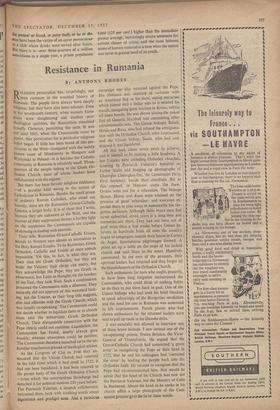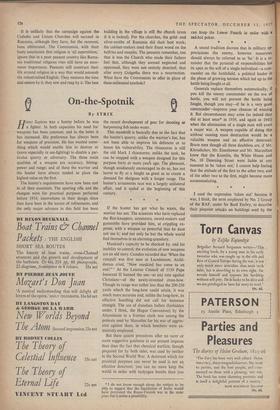Resistance in Rumania
By ANTHONY RHODES RELIGIOUS persecution has, surprisingly, not _ been common in the troubled history of Rumania. The people have always been deeply religious, but they have also been tolerant. Even In the seventeenth century, when western Euro- peans were slaughtering one another over theological quibbles, the Rumanians remained broadly Christian, permitting the sects. It was not until 1945, when the Communists came to Power, that persecution for a particular religious belief began. If little has been heard of this per- secution in the West—compared with the widely known cases of Mindszenty in Hungary and Wyszynski in Poland—it is because the Catholic Community in Rumania is relatively small. Three- quarters of the people belong to the Greek Or- thodox Church, most of whose leaders have collaborated with the regime. But there has been fervent religious resistance of a peculiar kind owing to the nature of Catholicism in Rumania. Besides the small group of ordinary Roman Catholics, who stood out bravely, there are the Rumanian Grieco-Catholic Uniates, a larger body. It is of these that I write, because they are unknown in the West, and the manner of their suppression throws a further light on the suppleness the Communists are capable of showing in dealing with enemies. Their title, Rumanian Grieco-Catholic Uniate, sounds to Western ears almost as anomalous as the Holy Roman Empire. To be Rumanian, Greek Orthodox, Catholic and Uniate at once sounds impossible. Yet this, in fact, is what they are. Their rites are Greek Orthodox, but they are under the Vatican; their clergy can marry, but they acknowledge the Pope; they are Greek in observance, but Latin in thought; on the borders of the East, they look West. Such a combination presented the Communists with a dilemma. They naturally did not approve of this westward look- ing; but the Uniates, as their long title suggests, also had affinities with the Greek Church, which was 'loyally co-operating.' The Communists could not decide whether to liquidate them or to absorb them into the subservient Greek Orthodox Church. Their disreputable connection with the Pope clearly could not continue. Liquidation, the Communists has found, nearly always gave trouble; whereas absorption could be painless. The Communists therefore launched on to the un- familiar treacherous ground of theological schism.
At the Congress of Cluj in 1948 they an- nounced that the Uniate Church had returned to the fold from which it had erred in 1722; it had not been liquidated, it had been restored to the parent body of the Greek Orthodox Church —from which 'the unscrupulous Habsburgs had detached it for political motives 250 years before.' The Patriarch Valerian, a staunch collaborator, Welcomed them back with soothing words about tcpentence and prodigal sous. And a ferocious campaign was also mounted against the Pope. His Holiness was depicted in cartoons with an American flag in his tiara, eating macaroni which turned into a dollar sign as it entered his mouth, instigating germ warfare in Korea, setting off atom bombs. He was shown kissing the naked feet of General Marshall and committing. other unmentionable sins. The Uniate bishops, Balain, Hossu and Rusu, who had refused, the anialgama- tion with the Orthodox Church, were imprisoned, and the Uniate bishop, Suciu, who had con- demned it, was liquidated.
All this took about seven years to achieve; and it seemed to be making a little headway. A few Uniates were attending Orthodox churches, listening to Patriarch Valerian's homilies on Father Stalin and hanging up photographs of Gheorghe Gheorghiu-Dej, the Communist Party First Secretary, beside their. crucifixes. But at this moment, in Moscow, came 'the thaw.' Orders went out for a relaxation. The bishops Balain, J-lossu and Rusu. were released on the promise of good behaviour; and everyone ex- pected them to pine away in honourable but for- gotten seclusion. Although these brave men had never submitted, seven years is a long time and memories are short. They had not been out of gaol more than a few weeks before Uniate be- lievers in hundreds from all over the country began to congregate outside their house in Curtea de Arges. Spontaneous pilgrimages formed. A priest set up a table on the steps of his locked church and said Mass in the street. Hundreds communed. In the eyes of the peasants, their spiritual leaders had returned and they forgot all the blandishments of the Orthodox Church.
Such enthusiasm for men who ought, properly, to have been long forgotten embarrassed the Communists, who could think of nothing better to do than to put them back in gaol. One of the Uniate bishops who had used his brief freedom to speak admiringly of the Hungarian revolution and the need for one in Rumania was sentenced to life imprisonment. Parish priests who had shown enthusiasm for the returned leaders were sent to pull up reeds in the Danube delta.
I was naturally not allowed to interview any of these brave bishops. I saw instead one of the 'co-operating' priests, Traian Belascu, the Vicar- General of Transylvania. He argued that the Greco-Catholic Church had committed 'a grave error' in recognising the Pope as their head in 1722, that he and his colleagues had 'corrected the error' by leading the people back into the Orthodox faith. He refused to recognise that the Pope had excommunicated him. Nor would he admit that the head of his Church was now not the Patriarch Valerian, but the Ministry of Cults in Bucharest. Above his head as he spoke in his church office a large photograph of the Com- munist premier gave the lie to these words. It is unlikely that the campaign against the Catholic and Uniate Churches will succeed in Rumania, although they have, for the moment, been obliterated. The Communists, with their hasty conclusion that religion is 'all superstition,' ignore that in a poor peasant country like Ruma- nia traditional religious rites still have an enor- mous importance. Peasants still construct their life around religion in a way that would astonish the industrialised English. They measure the time and season by it, they sow and reap by it. The best building in the village is still the church (even if it is locked). For the churches, the gold- and silver-smiths of Rumania did their best work; the cabinet-makers used their finest wood on the belfries and steeples. The peasants remember, too that it was the Church who made their fathers feel that, although they seemed neglected and oppressed, they were not entirely deserted; that after every Golgotha there was a resurrection. What have the Communists to offer in place of these millennial symbols?







































 Previous page
Previous page